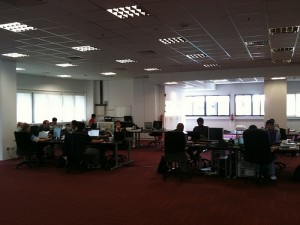
5 Ways To Manage Conflict In The Workplace
5 Ways To Manage Conflict In The Workplace Conflicts are a common occurrence in life, be it at home, in relationships, or at work. Conflict

5 Ways To Manage Conflict In The Workplace Conflicts are a common occurrence in life, be it at home, in relationships, or at work. Conflict

Do you start the day or does the day start you? Many emails to answer, meetings to attend, planning and organizing the day are some

The Great Resignation, also known as the Great Reshuffle and the Big Quit refers to an economic situation where employees voluntarily quit their job en

Whenever I ask people : How are you? Often the reply is “I am busy” or “I am crazy busy”. Very rarely do I hear

In this article, we want to share with you a Stress Scale that we have devised to help you get an idea about the extent to which you might be feeling stressed at work. We spend a considerable amount of our time being at work and when work becomes a stressor, it can impact us significantly and even spill on to other parts of our life. We hope that this Stress Scale also draws your attention to the not-so-obvious signs of stress that you might be experiencing.

Do you feel like you have no energy left to deal with the stresses of your job? Or, for that matter, your life? That you just ‘can’t take this anymore’? If you do, you are probably experiencing burnout.
At times, burnout goes unnoticed for long or gets addressed very late. By the time, the fatigue and distress the person experiences take a toll. How do you know if you are going through this?

When you are upset, tired or stressed, it becomes difficult to focus at work. You are more vulnerable to distractions and everything takes twice as long to do.
“I have been going through a difficult time since the past couple of days. I am shifting to a new house and there are soooo many things to take care of. It is very stressful and it is creating a tense family atmosphere as well. There are projects to finish at work but I find my mind drifting to these problems. It is becoming really difficult to concentrate at my job. My personal problems are starting to get the better of me. It’s affecting my work now! I don’t know what to do about it…”
– Mr.K.L, Senior Manager.
“It’s affecting my work.” Most of us have used this line at some time; generally, when something is going wrong in our personal life and it is starting to affect our productivity at work. It could be a fight with a friend. A neighbour who is causing you unnecessary trouble. Or like Mr. K.L, a tense family environment.
We feel stressed and our mind seems in disarray. It becomes difficult to focus on the task at hand. You don’t feel like working and you struggle to make it through the day.

A heavy workload and numerous deadlines would easily be one of the most stressful things about work. We live in an environment that demands quite a bit out of us and our ability. If you enjoy working to your fullest and find meaning in the work you do, then things are working out well for you. However, if you feel like work is hitting you even before you know it, and are caught up and pressurized, be assured, there are many others in the same boat! Well, sometimes, you cannot directly change the fact that you have a whole lot to do. However, you can, with gentle effort, try and make this just a little easier on yourself. We put up a post earlier that described 3 guidelines that would help you plan and anticipate your day better, to deal with a heavy workload.

Dread getting up in the morning to go to work? Is it the heavy workload that repels you? Many of you probably think of deadlines and workload when you think of work. It’s true that today, work pressures have mounted tremendously. You may have a lot to pack into each day. Though dealing with pressured deadlines and a heavy workload is stressful because it demands a lot out of you, there is little option you are left with. Maybe you cannot change the fact that you have a lot to do at work, today and on most days. Yes, this is tiring and demanding. However, is there something you can do to make this situation just a little easier on yourself? Even if it means worrying just a little lesser about how you will manage or being a little clearer about how much you can do? Often these little efforts help in cutting out from the stress and lending you some more energy to cope with the day.

In the previous section of this blog post, we described how you can identify if you are stressed because you are focusing too much on progress. In this section, we first dwell on why we sub-consciously develop this mindset. Then, we move on to describe what we can do to avoid over-focusing on progress.

We specialize in combining psychotherapy with deep wellness practices like mindfulness and meditation and creating a customized mental health plan for individuals and organisations.
We specialize in combining psychotherapy with deep wellness practices like mindfulness and meditation and creating a customized mental health plan for individuals and organisations.

A young woman from another country moved with her family to live for one year in a town near the monastery. When, in the course of the year she discovered the monastery, she would periodically visit to have discussions with the Abbess. The Abbess introduced her to meditation, which became very meaningful for the young woman.
When the family’s year-long stay was drawing to an end, the young woman asked the Abbess, “In my country there is no Buddhism and no one has even heard about meditation. How can I continue to learn and deepen the practice you have started me on?”
The Abbess said, “When you return home ask far and wide for who, among the wise people, is recognized as having the greatest ability to listen. Ask that person to instruct you in the art of listening. What you learn about listening from such a person will teach you how to further your meditation practice.
― Gil Fronsdal, A Monastery Within: Tales from the Buddhist Path